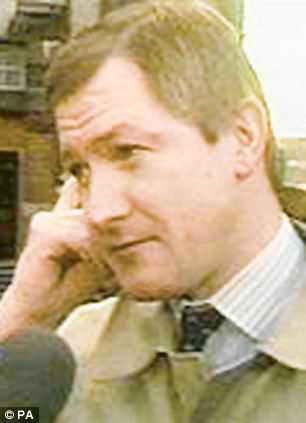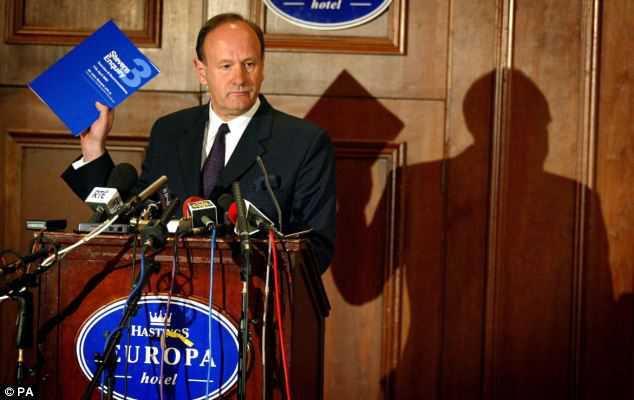
- 38-year-old was shot dead in front of his wife and children at home in 1989
- Report by Sir Desmond de Silva QC published today reveals the killing might not have happened without the involvement of security agencies
- Widow Geraldine has repeatedly called for a full public inquiry
- David Cameron admitted there was collusion between police and loyalists responsible for the killing but only ordered a review of the case
David Cameron said the Government was ‘deeply sorry’ yesterday after a report into the murder of solicitor Pat Finucane found the security services colluded with the loyalist terrorists who killed him.
A review of the case by Sir Desmond de Silva, QC, found the father-of-three would probably not have been executed by the Ulster Defence Association without the encouragement of British agents.
Sir Desmond said state employees ‘furthered and facilitated’ the shooting of the 38-year-old, who was gunned down in front of his family in 1989.
But his finding that there was no evidence of an over-arching conspiracy involving ministers or security chiefs to target Mr Finucane sparked calls for a full public inquiry.
The widow of murdered Belfast solicitor Mr Finucane slammed a report into his death as ‘a sham… a whitewash… a confidence trick’.
Geraldine Finucane said Sir Desmond de Silva’s report was ‘not the truth’ and renewed her call for a full public inquiry.
In a Commons statement today, David Cameron admitted Mr Finucane might still be alive had police and state agencies not colluded in his murder.
The Prime Minister said the ‘appalling crime’ was the result of ‘shocking levels’ of state collusion and apologised on ‘behalf of the government and the whole country’.
The de Silva review into the 1989 killing found that state employees actively ‘furthered and facilitated’ the loyalist murder of Mr Finucane.
But the victim’s family have criticised the review, insisting only a full public inquiry will reveal the truth about his murder.
The 38-year-old was shot in front of his wife and children at home by loyalist paramilitaries from the Ulster Defence Association in 1989.
At a press conference after the review was published, Mrs Finucane accused the British Government of suppressing the truth while attempting to blame dead individuals and disbanded organisations while exonerating ministers, serving officers and existing security agencies.
Mrs Finucane said: ‘Yet another British government has engineered a suppression of the truth behind the murder of my husband, Pat Finucane.
‘At every turn it is clear that this report has done exactly what was required – to give the benefit of the doubt to the state, its Cabinet and ministers, to the Army, to the intelligence services and to itself.
‘At every turn, dead witnesses have been blamed and defunct agencies found wanting. Serving personnel and active state departments appear to have been excused.
‘The dirt has been swept under the carpet without any serious attempt to lift the lid on what really happened to Pat and so many others.
‘This report is a sham, this report is a whitewash, this report is a confidence trick dressed up as independent scrutiny and given invisible clothes of reliability. But most of all, most hurtful and insulting of all, this report is not the truth.’
Mr Cameron told the Commons said the review had found the Army and Special Branch had advance notice of a series of assassinations planned by the loyalist paramilitary group, the Ulster Defence Association (UDA), but nothing was done.
The review found a ‘relentless’ effort to stop justice being done with Army officials giving the Ministry of Defence highly misleading and inaccurate information, Mr Cameron said.
Successive UK Governments are accused of a ‘wilful and abject failure’ to properly control secret agents within paramilitary groups.
Mr Cameron said: ‘It is really shocking this happened in our country. Collusion demonstrated beyond any doubt by Sir Desmond, which included the involvement of state agencies in murder, is totally unacceptable.
‘We do not defend our security forces or the many who have served in them with great distinction by trying to claim otherwise. Collusion should never, ever happen.
‘On behalf of the Government and the whole country, let me say again to the Finucane family I am deeply sorry.’
The review found no evidence that any Government was informed in advance of Mr Finucane’s murder or knew about the subsequent cover-up.
Sir Menzies Campbell, former Lib Dem leader, said he had never heard a statement in the Commons which filled him with more ‘revulsion’.
However, today Mr Finucane’s son John said he could not believe that there had been a public inquiry into newspapers hacking mobile phone messages but not into state involvement in the death of a British lawyer.
‘We’re talking about the murder of a lawyer in the UK,’ he told BBC Radio 4’s Today programme.
‘I rather flippantly announced last year that I thought it would have been easier if my father’s phone had been hacked rather than being killed. That’s not in any way to disrespect the victims of phone hacking.
‘But if we can have an inquiry into something as important as that, this case is the murder of a lawyer which the British government have admitted there was collusion, you don’t then deal with that, such a fundamental attack on democracy, by holding a non-statutory review behind closed doors.’
Mr Cameron has apologised more than once for the collusion between police and the loyalists responsible for the murder.
But Mr Finucane added today: ‘An apology is not in the correct running order. You don’t apologise for something but then not fully admit what it is you’re apologising for. I think that’s what the Prime Minister has done.’
The Finucane are unhappy that in 2001 the British government agreed during peace talks to meet honour for public inquiries into deaths. Of five recommended, four were held but in Mr Finucane’s case it was rejected.
Mr Funucane said: ‘The only case that’s outstanding is the case of my father. This review, we feel, is the embodiment of a broken promise of the British Government. We do feel that if they are sincere in dealing with this issue then they need to grasp this issue and they need to deal with it in a credible fashion.’
The loyalist paramilitaries shot Mr Finucane 14 times as he sat eating a Sunday meal at home, wounding his wife in the process. The couple’s three children witnessed the attack.
The former head of the Metropolitan Police in London, Sir John Stevens, has previously investigated collusion claims surrounding Mr Finucane’s death.
Shortly after starting the new inquiry, the Stevens team charged former Royal Ulster Constabulary Special Branch agent and loyalist quartermaster William Stobie in connection with the killing.
But in November 2001 the case collapsed and he was shot dead outside his home within weeks.
In September 2004 a loyalist accused of murdering the solicitor pleaded guilty to murdering him. Ken Barrett entered his plea at the beginning of his trial.
Prime Minister David Cameron, who ordered the de Silva review, will deliver a statement to the Commons
In 2004, retired Canadian judge Mr Justice Peter Cory, asked by the Government to investigate cases of suspected collusion, concluded that military and police intelligence knew of the Finucane murder plot and failed to intervene. He recommended a public inquiry.
That year, Barrett was sentenced to 22 years’ imprisonment.
In 2004, then Northern Ireland Secretary Paul Murphy announced an inquiry under new legislation introduced in 2005.
The Finucane family opposed the Inquiries Act 2005, arguing it would allow government to interfere with the independence of a future inquiry because a government minister could rule whether the inquiry sat in public or private.
As a result, plans to establish an inquiry were halted by former Northern Ireland Secretary Peter Hain.
In October 2011, the Government ruled out a public inquiry into Mr Finucane’s murder but put forward a proposal for a leading QC to review the case. That review is to be published today.

Daily Mail

Leave a Reply